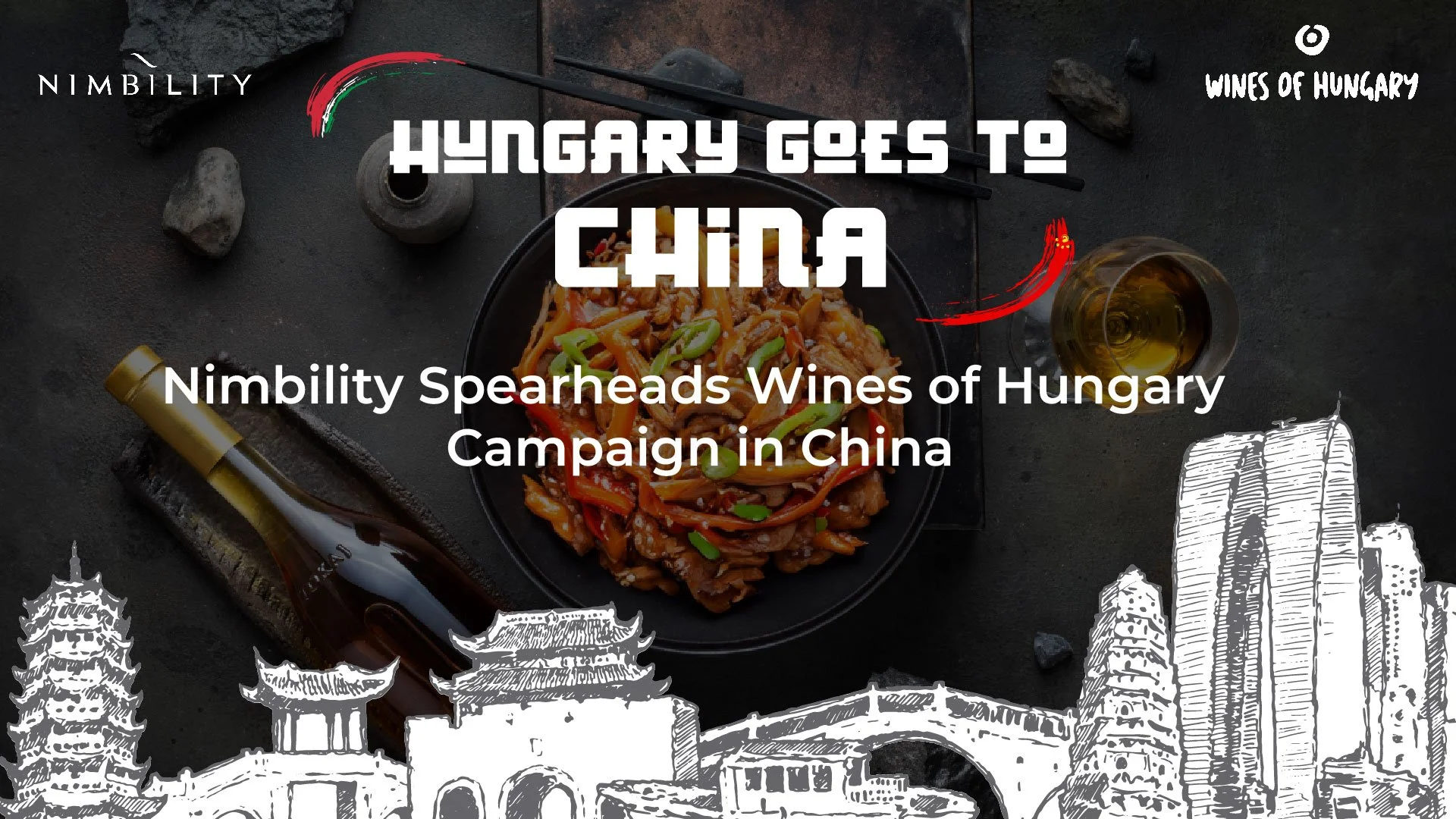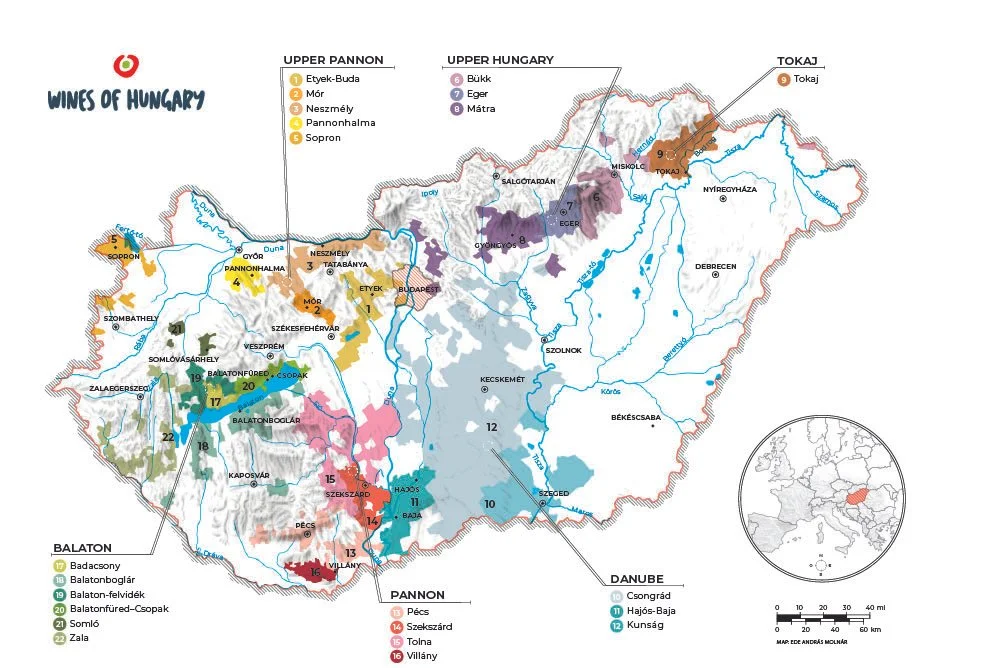Nimbility Spearheads Wines of Hungary Campaign in China
PRESS RELEASE - February 2025
Wines of Hungary’s China campaign will ramp up this March with a three day roadshow to highlight the rich heritage, diversity and versatility of Hungarian wines.
Kicking off in Shenzhen at The Park Hyatt on March 10, the Wines of Hungary China Roadshow will start with an in-depth Masterclass on Hungarian wines hosted by Fongyee Walker MW, China’s most influential Master of Wine. This event will be the first time the Hungarian Wine Marketing Agency founded in 2023 organises such a campaign in China. A selection of eight top Hungarian wines are to be presented by an MW in China, and as such, marks a key milestone for Wines of Hungary in the region. It will aim to give guests the highest level of knowledge and understanding of the unique offerings of Hungarian wines as well as highlighting their commercial potential for key industry buyers.
This will be followed by a walk-around tasting of a further 20 wines for guests to explore the true diversity that Hungarian wines can offer. Guests invited will include top importers, distributors, retailers, sommeliers, press, media and influencers in an attempt to build awareness, visibility and reputation for wines of Hungary, as well as increase their overall availability in the China market.
From Shenzhen the roadshow will move to Shanghai for a similar series of events on March 12 to be hosted at luxury hotel The Middle House in the heart of Jing’an. On March 13 a Gala event, introduced by Government Commissioner for National Wine marketing Pál Rókusfalvy in cooperation with the Embassy of Hungary in Beijing, will take place at Bon Boeuf Restaurant in Beijing to mark the final event in this hotly anticipated series of events showcasing the very best that Hungarian wines have to offer.
“We are incredibly excited to be moving into the heart of this campaign for Wines of Hungary in China this coming March,” said Pál Rókusfalvy. “We are honoured that Fongyee Walker MW will be presenting our wines as her deep knowledge of both wines and the China market positions her perfectly to be able to communicate the uniqueness of Hungarian wines while clearly demonstrating to the trade that wines from Hungary should be a part of their offering.” Before the gala event, an official visit will be paid to the recently opened House of Hungarian Wines in Moshikou, Shijingshan District.
Nichole Mao, Partner at Nimbility heading up the Wines of Hungary promotional campaign in China, had this to say: "The upcoming roadshow events will mark the centrepiece of this year’s Wines of Hungary campaign in China. I’m delighted that we are working with Fongyee Walker MW for these events as her extraordinary knowledge and light-hearted presentation style will be the perfect combination for explaining to our guests the many attributes that Hungarian wines have to offer.”
Besides the roadshow, the city of Chengdu is planning a high-level meeting with the Government Commissioner in March to further strengthen the previously concluded cooperation agreements for the joint international promotion of botrytized sweet wines of Tokaj and Sichuan cuisine. Between December 10, 2024, and January 28, 2025, two restaurants of the Chengdu-based Chaimenhui restaurant chain - including the Michelin star Chairman Hui - promoted the experience of pairing Sichuan dishes with Tokaj wines available in China, while also showcasing Tokaj, Hungarian wine culture, and the Wines of Hungary brand. The city of Chengdu has expressed interest in continuing the campaign, as the pilot project has demonstrated that pairing Tokaj wines can be an effective tool for the international promotion of Sichuan cuisine.
For more information about the Wines of Hungary campaign in China, please contact nichole@nimbilityasia.com
About Wines of Hungary
Heritage
Hungary’s wine heritage spans centuries, and archaeological evidence suggests that the Celts began growing grapes and producing wine in the Central European region as early as the 1st century BC. This tradition was further developed during the Roman Empire, with the Transdanubia region being the heart of a rich wine culture.
Later, the Hungarians settled in the Carpathian Basin, where ancient, local and Central Asian traditions brought by the Hungarians themselves gave rise to Hungary’s own unique viticultural methods.
The Hungarian word for wine, “bor”, encapsulates the centuries-long cultural heritage that originates from Central Asia. According to Chinese chronicles, the sacred mountain of the ancestors of the Hungarians was called Bor Tengri, where sacrifices were made to the God of Rebirth. In the ancient language of the Hungarians, the word "bor" had a dual meaning: on one hand, it denoted rebirth, the mystery of the transformation of the dawn and dusk sky; on the other hand, it referred to the rebirth of fermented grape juice into wine.
This rich history forms the basis for Hungary’s revered viticultural tradition, which has flourished for centuries and continues to attract wine lovers from all over the world.
Different terroirs, grape varieties and wine styles
The wine regions of Hungary, located in the heart of Europe, range from the volcanic landscapes of Tokaj to the hilly Mediterranean terrain of Villány, boasting a wide range of landscapes, soils and climates – a rich variety of terroirs, as we call them. Viticulture in Hungary is distinguished by its unique grape varieties, combining tradition and innovation. From the famous white wine grape Furmint to the intense red wine grape Kékfrankos, each of these has contributed to Hungary’s international reputation for winemaking. In addition, the internationally renowned Cabernet Franc grape from the Villány region, Villányi Franc, gives Hungarian wines a new dimension.
Hungarian wines offer a diverse range of flavours, from the lusciously sweet Tokaji Aszú to the refreshingly spicy Bikavér (aka Bull’s Blood) blended red. Whether mineral-rich white wines from volcanic soils or full-bodied reds from loggerheads (soft, rich soils) or calcareous (limestone) soils, there is a wine to suit every taste and every special occasion. Deeply rooted in tradition, Hungarian winemakers embrace innovation and constantly push the boundaries of technology, continuously improving their winemaking skills. From modern winemaking techniques to sustainable practices, the Hungarian wine industry embraces tradition and progress at the same time.


